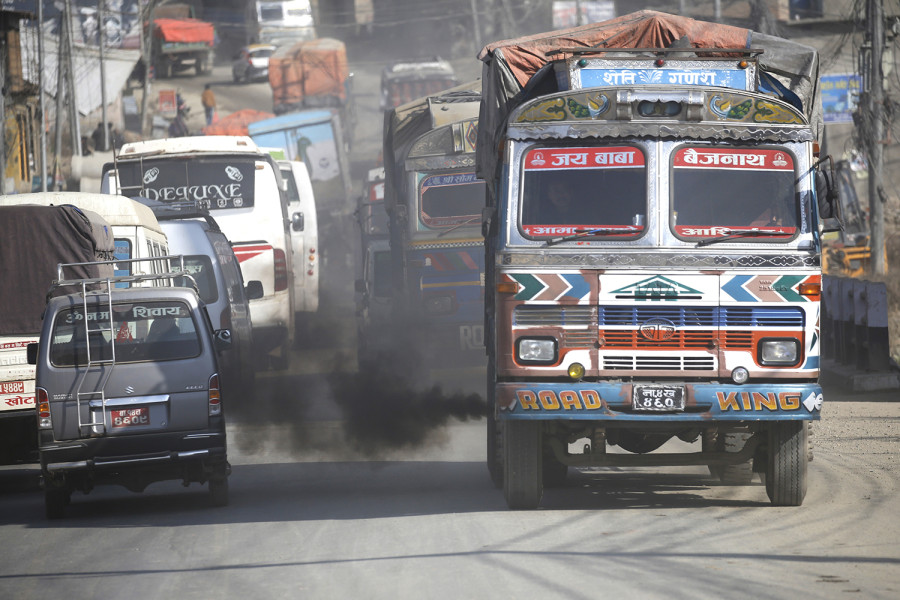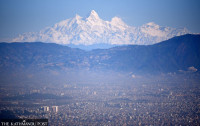Climate & Environment
Nepal’s transition to Euro VI fuels not likely to significantly impact air pollution levels
As most vehicles are poorly maintained and do not meet the government’s emission standards, cleaner fuels are unlikely to have much effect, say environmentalists.
Himendra Mohan Kumar
With India transitioning to cleaner Euro VI compliant fuels, Nepal, which imports all of its petroleum products from the southern neighbour, will be following suit. But the new European standard fuels, which are supposed to be cleaner and more eco-friendly, are unlikely to have any major impact on rising pollution levels in the country, say environmentalists.
According to the Nepal Oil Corporation, Euro VI-compliant petrol and diesel will contain less sulphur and consequently, there will be less pollution.
“Cleaner fuels will increase the performance of the engines and may even lead to better fuel efficiency of vehicles,” said Birendra Goit, marketing director of the Nepal Oil Corporation. “India is making the switch to cleaner fuels due to its own statutory requirements but Nepal will also benefit as we will be importing cleaner fuels at no extra cost.”
But environmentalists are only with Goit half-way.
“Most motor vehicles in Nepal only comply with Euro II or Euro III norms,” said environmentalist Bhushan Tuladhar, who is also on the board of Sajha Yatayat. “The emerging scenario is that Euro VI fuels will now be powering engines that are technologically older.”
According to Tuladhar, there will be some positive impact because engines will burn less fuel and release fewer emissions. However, the full environmental impact of having cleaner fuels will only come when Euro VI-compliant vehicles get to use Euro VI-compliant fuels.
“Unfortunately, that’s not the situation at the moment,” he said.
India has set April 1, 2020 as its deadline to move to Euro VI-compliant fuels in order to reduce carbon emissions. The change was necessitated by a ruling of the Supreme Court of India which said that all vehicle sold across the country, effective from the cut-off date, should be Euro VI compliant.
While Euro IV fuels contain 50 parts per million (ppm) sulphur, Euro VI grade fuel only has 10 ppm sulphur content. Harmful nitrogen oxide emissions from diesel cars can be brought down by nearly 70 percent and in petrol cars by 25 percent with the use of Euro VI fuel. The new standard is also believed to reduce cancer-causing particulate matter in diesel emissions by up to 80 percent. The Euro standard of fuel is based on the European Union’s fuel and emission standards that were first introduced in 1993. Since then, standards have consistently improved to make fuels cleaner and more environment-friendly.
Manjeet Dhakal, another environmentalist, who is a team leader at the climate policy institute Climate Analytics, said that while the introduction of cleaner petrol and diesel may help in reducing air pollution levels in Nepal, it still won't address the root of the problem.
“Motor vehicles that run on fossil fuels remain the biggest polluters,” said Dhakal. “What’s even more concerning is the number of petrol and diesel-driven motor vehicles continues to rise in the country.”
In the last financial year, Nepal imported around 2.5 million kilolitres of petroleum products from India, the bulk of which was diesel, followed by petrol.
Environmentalist Dhakal said that the government should instead make a push toward lowering the import of petroleum products and encouraging the use of electric vehicles by making them more cost-effective.
According to the Department of Transport Management, in Kathmandu alone, there are more than 1.2 million two-wheelers and over 300,000 four-wheelers. Vehicular pollution is the main contributor to air pollution in the country.
According to a study published last year by the Nepal Health Research Council, about 12 percent of the country’s population—aged 20 years and above—has been found to be suffering from chronic obstructive pulmonary disease. Statistics from the Ministry of Health and Population show that since the 1990s, air pollution, which was the 10th leading cause of disability, had become the second leading cause by 2019. An estimated 35,000 people die in Nepal every year due to diseases directly linked to air pollution, according to the Nepal Academy of Science and Technology.
In an effort to reduce vehicular emissions, the government imposed a ban in 2018 in the Kathmandu Valley on the operation of vehicles that are more than 20 years old.
Rajan Thapa, country director for Clean Air Asia, an international non-governmental organisation which works for better air quality, said that significant improvements in air quality will only come about if people start regularly servicing their vehicles.
“Regular servicing and maintenance of vehicles are equally significant. Vehicles that are not serviced regularly emit more pollutants,” said Thapa.
As per the Vehicle Emission Standards implemented by the Nepal government in 2003, the carbon monoxide emission levels for four-wheelers registered before 1980 should not exceed 4.5 percent of total emissions. Emissions should also contain just 1,000 ppm of hydrocarbons. Four-wheelers registered after 1981 should not emit carbon monoxide exceeding three percent of total emissions and should emit below 1,000 ppm hydrocarbons.
Similarly, carbon monoxide emissions for two-wheelers should not exceed 4.5 percent of total emissions, while their hydrocarbon emission should be less than 7,800 ppm.
A majority of the vehicles on the streets of the Kathmandu Valley, however, are not in compliance with the government’s standards, according to the Kathmandu traffic police. The Metropolitan Traffic Police Division conducts pollution control campaigns round the year, inspecting motor vehicles at random to check whether they comply with emission norms. But according to the traffic police, more than half the vehicles fail the test. Owners or drivers are fined ranging from Rs 500 to Rs 1,500 depending on the toxicity of the emission, but that is not a strong enough deterrent, said a senior traffic police department official.
“Pollution awareness programmes should be increased countrywide and the government should amend prevailing laws so that owners of polluting vehicles can be fined a minimum of Rs5,000,” said Bhim Prasad Dhakal, chief of the Metropolitan Traffic Police Division. “That would serve as a good deterrent.”
(Chandan Mandal contributed reporting.)




 14.24°C Kathmandu
14.24°C Kathmandu










